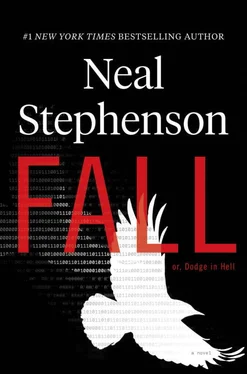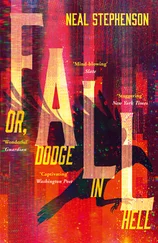The doctor’s staff had been very firm on the point that, following the procedure, he would be unfit to drive because of the powerful drugs they were going to give him—that he would, for all practical purposes, be an ambulatory basket case, and that they wouldn’t even begin the procedure unless he had a designated minder who would sign him out afterward and take responsibility for keeping him away from heavy machinery. Accordingly, Richard now walked two blocks to a transit stop, boarded a city bus that would take him to the medical complex on the hill above downtown, and made himself comfortable in a seat amidships.
He woke up his phone. Its home screen was chicken-poxed with little red dots with accusatory numbers in them, the consequences of having turned a deaf ear to the Din for twelve whole hours. He willed himself not to see those and instead brought up his address book. He scrolled to the K section and found five different entries for Corvallis Kawasaki. Some of them had little pictures attached to them, which helped Richard guess how out-of-date they were. Most had accumulated during the years that Corvallis had worked hand-in-glove with Richard at Corporation 9592, the game company that had made Richard a billionaire and Corvallis, in the lexicon of the tech business world, a decimillionaire. The pictures on those tended to show him hoisting pints in bars or in various funny/celebratory poses connected with the company’s rise to prominence in the online gaming industry. One of them, however, was a very straight, formal head shot of Corvallis with his hair neatly trimmed and gelled, wearing a suit and tie. This card—which was only a few months old—identified him as the CTO of Nubilant Industries, a company that did cloud computing. It had been formed last year as part of a “roll-up,” which was tech biz parlance for acquiring and combining several companies that were all operating in the same “space.” Corvallis had been induced, by means of a hefty stock option grant, to leave his position at Corporation 9592 and join the new company. Richard had been sorry to see him go, but he had to admit that it was an excellent fit—Corvallis had overseen the shift of all Corporation 9592’s operations from old-fashioned server racks to the cloud, and he hadn’t been as lavishly compensated as others who had been luckier in their timing. Since Corvallis’s departure to Nubilant—which was headquartered near downtown Seattle—he and Richard had exchanged texts on several occasions, trying to find time to meet up for a drink. So far, it had not come together. But when Dodge pulled up his Corvallis text message stream, he found, at its tail, a flurry of messages from over the preceding weekend, in which Corvallis agreed to take the afternoon off and serve as Richard’s designated minder, collecting him from the clinic in his narcotic haze and taking him to lunch or something as he returned to his senses.
omw to clinic, Richard thumbed. Then he fetched a substantial pair of headphones from his bag and placed them over his ears. The sounds of the bus were muted. He plugged the cord into the phone and turned the headphones on. For these were electronic noise-canceling headphones. Directly they began to feed anti-noise into his ears, making everything quieter yet.
Corvallis texted back, K . The phone displayed the ellipsis indicating that he was still typing.
Dodge activated the music player app and began scrolling through his playlists, looking for the P section. His tinnitus was ramping up because of the unearthly quiet produced by the noise-canceling feature.
Corvallis added, if u r feeling up to it I will take you by the office—would like to show you what we are up to—cool stuff!
Richard decided not to respond to that one. As much as he liked Corvallis, he dreaded going on tours of high-tech companies. He tapped the words “Pompitus Bombasticus.” The lavish tonalities of a full symphony orchestra, backed up by a choir and fortified by a driving modern percussion section, filled his ears. Pompitus Bombasticus was Richard’s favorite group. Apparently it was just one guy working alone in a studio in Germany; the philharmonic, the choir, and all the rest were faked with synthesizers. This guy had noticed, some years ago, that all inexpensive horror movies used the same piece of music—Carl Orff’s Carmina Burana —in their soundtracks. That opus had become a cliché, more apt to induce groans or laughs than horror. This German, who had been living the starving-artist lifestyle while trying to establish a career as a DJ, had been struck by an insight that had transformed his career: the filmmakers of the world were manifesting an insatiable demand for a type of music of which Carmina Burana was the only existing specimen. The market (if the world of composers and musicians could be thought of as such) was failing to respond to that demand. Why not then begin to make original music that sounded like the soundtrack of the sort of movie scene in which Carmina Burana inevitably played? It didn’t have to sound exactly like Carmina Burana but it needed to evoke the same feelings. The German gave himself a new name, which was Pompitus Bombasticus, and put out a self-titled album that was enthusiastically ripped, torrented, downloaded, and stolen by innumerable aspiring young filmmakers united by a common sentiment that if they heard Carmina Burana one more time they would shove pencils into their ears. Since then, Pompitus Bombasticus had come out with five more albums, all of which Richard had legally downloaded and merged into this one long playlist. The breathtaking sweep and emotional bandwidth of the music made unloading the dishwasher seem as momentous as the final scene of 2001: A Space Odyssey . In this case, it cast a haze of fake poignancy over this text from C-plus (as Dodge called Corvallis). He did not wish to come out and say as much directly, for fear that C-plus would take it the wrong way, but, in the later phases of their professional relationship, C-plus’s role had become less all-around tech expert and more general intellectual sidekick and helpmeet. When it came to all of the stuff that Richard had omitted to learn during his extremely colorful late teens and early twenties, Corvallis Kawasaki was Virgil to his Dante, Mr. Peabody to his Sherman.
As an example, when Richard had remarked, a few years ago, on the fact that nearly all of his dreams were set in the landscape of the same small town in Iowa, C-plus had told him that this was related to a well-known insight by a German philosopher named Kant, who had posited that the mind simply was not capable of thinking about anything at all without mapping it onto space and time. The brain was just hooked up that way, nothing you could do about it. Young Richard had learned the basic properties of space-time by pedaling around a particular street grid on his bicycle, trick-or-treating on particular blocks, fleeing from big kids and vice principals through convenient backyards. It was burned into his neural “connectome” now; it was the Kantian substrate of all mental activity relating to space and movement. Perhaps worrying that Richard wasn’t following his argument, C-plus had then wrapped it all up by likening it to the hexagonal graph paper that nerds used to plot out the landscapes on which war games were prosecuted. This final detail had planted a suspicion in Richard’s mind that C-plus was just fucking with him. This had all happened, for no particular reason, minutes before a board meeting: the most important board meeting in the history of Corporation 9592, during which they announced that the company’s annual revenues now exceeded those of the Roman Empire at the height of the Augustan Age. Richard had fobbed the task off on the CFO, who would revel in that kind of thing. While the CFO was running through his PowerPoint deck, Richard had pulled out his phone and, in a merely pro forma attempt to conceal what he was doing, had, under the conference table, Googled Kant. The results looked formidably hard to read but sufficed to prove that there had actually been a guy named Kant and that he had indeed concerned himself with such topics.
Читать дальше
Конец ознакомительного отрывка
Купить книгу

![Нил Стивенсон - Криптономикон [litres]](/books/23868/nil-stivenson-kriptonomikon-litres-thumb.webp)






![Нил Стивенсон - Падение, или Додж в Аду. Книга первая [litres]](/books/392729/nil-stivenson-padenie-ili-dodzh-v-adu-kniga-perva-thumb.webp)
![Нил Стивенсон - Лавина [litres с оптимизированной обложкой]](/books/414066/nil-stivenson-lavina-litres-s-optimizirovannoj-ob-thumb.webp)

